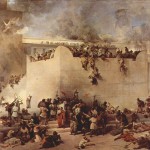As a pastor in varying roles over the years, I’ve been advised by mentors, friends, and everyone in between to read works outside of the field of Bible and theology. Most commonly, it’s recommended that pastors read non-Christian literature, poetry, fiction, and leadership/business books.
The idea behind this advice is simple: reading other genres and disciplines helps expand your horizon as a pastor, writer, and leader. Reading non-Christians helps you better understand the culture you’re trying to reach. Reading poetry and fiction helps liven your preaching and writing. Reading business/leadership books helps you think more organizationally, because Bible and theology are relatively simplistic on these things. Reading widely is, then, a way for the pastor to grow into a “holistic” and “well-rounded” leader.
I basically agree with all of the above (though all of these “benefits” can play into superficialism rather quickly). Poetry has never quite grabbed me—as you can probably tell by my writing!—but I’ve certainly benefitted from fiction. I love to read non-Christian works, especially cultural commentary and criticism. There’s no better non-Christian writer, to me, than Chuck Klosterman. He challenges my writing, storytelling, and flow of logic as much as any theologian. I’ve also enjoyed insights from business and leadership books, which have especially helped me in a non-for-profit business environment, leading a team working on the Christian Standard Bible.
All of this said, too often pastors would rather read these works than books on Bible and theology. I can name off-hand a few pastor friends who read more business/fiction/how-to books than they do theology books. This tendency, for example, has led to dangerous ecclesial models in American churches. We’ve built man-centered kingdoms on the personalities of a few charismatic leaders, and the way we structure our leadership and Sunday gatherings makes this glaringly obvious. Perhaps we get bored of reading this stuff after seminary, or we think it’s not as “practical,” but theology is the most practical thing in the world, especially for pastors.
I’ve also witnessed pastors begin reading so much poetry and fiction and cultural criticism that they begin to fudge on doctrine, because they’re trying to be a “better communicator” or more “relevant.” The primary danger here for pastors is the tendency to let a catchy illustration or analogy actually obscure rather than clarify God’s Word for people. If people walk away with a good illustration yet without biblical truth, it’s a net loss.
A final concern with pastors spending too much time reading works outside of biblical and theological studies is the propensity to get rusty. Like anything, months and years away from regular ingestion of rich biblical truth and commentary can make us weak or sedated theologically, which ultimately puts us in danger of violating a key biblical command for pastors—guarding the good deposit. I know many pastors who read one theological work to every three non-theological works. Might I suggest—since the calling of the pastor is so great, so dire, so important, and so clear—that we make biblical and theological books at least half of everything we read?
The calling to teach is extraordinarily high (Jam. 3:1), and pastors who don’t preach and teach right doctrine are more dangerous and insulting to the cause of the gospel than any Richard Dawkins book or “anti-Christian” political agenda. When pastors point to others “out there” who are “leading people to Hell,” but aren’t preaching, teaching, and counseling with rich biblical truth, they’re pointing their finger in the wrong direction. We can build fans of our churches with eloquent sermons and rocking programs and Fortune 500 principles, but we’re not ultimately building followers of Jesus with those things. It’s not wrong to want to communicate well and pursue logistical excellence, but not at the expense of discipleship and deep truth. Better to be “boring” with the gospel than entertaining without it.
This is not an indictment on reading widely. I encourage it. As I said, I’ve benefitted from it. But biblical and theological sharpness is a fundamental, basic characteristic of a qualified elder (1 Tim. 3:2; 4:11; 6:2). Pastors are the shepherds of souls, not the leaders of organizations (Heb. 13:17). They should be the resident theologians who are making their congregation into theologians, not CEOs making middle managers. Shouldn’t our day-to-day study habits reflect this call?
—
Stay in touch! Email me at ChurchGrammar@gmail.com.

















